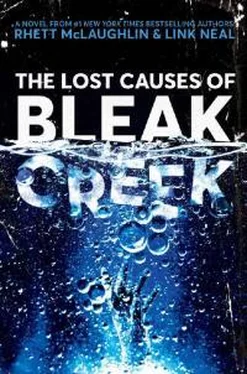Janine refused to be discouraged. Screw a movie about old people’s kidney stones. This was the film she needed to make, whether or not her cousin was down to participate. She’d asked Tommy, the pimply-faced server, if she could interview him, but Big Gary—still furious over his spilled treasures—had ordered her to get out of his restaurant before he called the cops, which had only confirmed Janine’s suspicions that she was onto something. She’d slipped Tommy her number (well, GamGam’s number) on a scrap of placemat, and, to her surprise, he’d called that night. Which is how Janine now found herself walking the quarter mile from her grandmother’s house to the home of Tommy Dowd.
Janine pressed the doorbell and listened as it triggered a rising and falling sequence of chimes. Before the doorbell stopped ringing, Tommy answered the door.
“Uh, hi,” the boy said, seeming surprised that she’d actually shown up.
“Hey, Tommy. Where should I set up?”
“Um…”
“My camera,” Janine said, gesturing to her bag.
“Oh, uh…let’s go to the backyard.”
Janine followed Tommy around the side of the house, passing a large German shepherd chained to a pole, the dog growling but unwilling to deliver a proper bark. They finally arrived at two mildewed lawn chairs Tommy thought would be perfect for their talk.
“So, how long were you at the Whitewood School?” Janine asked once the camera was rolling.
“Uh, I…Well, I…” Tommy began, clearly uneasy. “I think it was about four months.”
“Tell me about your time there. How are students…reformed?”
“It was, um, really good for me,” Tommy said. “I learned how to, um, respect my, uh…elders.” Janine noticed that Tommy’s eyes were darting between the ground and somewhere on her clothes. Just like Donna, she thought. Unable to make eye contact. Then it hit her. He’s looking at my shoulder. Janine had failed to consider how something as innocuous as the collarbone of a mysterious older woman could derail a teen boy’s thoughts. That’s why he agreed to this meeting .
“But what happens specifically at the school? How do they…change you?” Janine pressed.
“Um, I’m sorry,” Tommy began muttering, having now developed the courage to lock in directly on her shoulder. “I’d rather not talk about that. But like I said, it was, um, really really good for me.”
Janine pulled her T-shirt up over her shoulder. Tommy’s face reddened.
“Is that part of the deal? You’re not supposed to talk about what happens at Whitewood?” Janine pushed further.
Tommy was squirming even more, and not just because his wandering eyes had been exposed. “I think I should go back inside. Thank you, um, Ms. Blitstein.” He stood up abruptly and stiffly jogged back to the screened back door.
—
JANINE PULLED TO the side of the road, awkwardly reaching across the passenger seat of her GamGam’s Grand Marquis to roll down the window. “Excuse me,” she said to an older couple walking out of the post office. “Would you happen to know how to get to the Whitewood School?”
They stared at her. “You know parents ain’t allowed to visit, right?” the man asked, adjusting his John Deere hat.
“Of course,” Janine said, not missing a beat. “I’m just taking a look to see if I, uh, want to send my daughter there. She’s being a real terror.” Imagining herself as a mom freaked her out, but she tried to seem as normal as possible.
“It’s a very good school,” the woman said, eyeing the length of the car, then staring at Janine with more than a hint of skepticism about her ability to operate such a massive vehicle.
“I don’t know what seein’ it is gonna do,” the man said. “You either want to send her or you don’t. And you can’t even really see it from the road anyhow.”
“Well, a mother likes to know her child is gonna be okay. You know, get some peace of mind,” Janine said, hearing how unbelievable she sounded.
“What kind of trouble is she in?” the woman asked.
“Gangsta rap,” Janine said without thinking.
“Gang-ster rap?” the man asked.
“Yep. She listens to it nonstop. Ice-T, Ice Cube…all the Ices. She hates cops.” Janine was almost cringing at this point.
“Oh my word,” the woman said. “And you look mighty young, so she can’t be that ol—”
“She’s six,” Janine said.
The couple was shocked. The man grabbed the bill of his hat and adjusted it right back to where it was.
“Yes, it’s horrible,” Janine added, laying it on thick.
“All right,” the puzzled man said, ready for this conversation to end. “Just follow Main Street until it hits Creek Road. Take a right, and after a while you’ll see the gate. They won’t let you drive onto the premises, though.”
“Great, thanks,” Janine said. “I won’t even try.”
The man nodded without smiling. Janine rolled the window up and pulled the mammoth brown-and-beige automobile back onto the street. In the rearview mirror, she could see the couple still standing there, their furrowed brows watching her drive away.
Janine passed by the Bleak Creek landmarks she’d seen hundreds of times during her visits over the years: the redbrick First Baptist Church with its towering steeple, less than fifty yards from the light brown brick Second Baptist Church with its slightly taller steeple; Blanchard’s Bait ’n’ Tackle, which she’d literally never passed without seeing the WE’LL BE RIGHT BACK sign in the window; the THOMAS & THOMAS LAW OFFICE in an imposing plantation-style house, making it a rather ironic bastion of justice. She’d always considered these places the staples of a polite southern small town, but with her looming questions about the Whitewood School, they seemed almost like a façade, carefully constructed exteriors hiding decidedly impolite truths.
She turned onto Creek Road and soon it was nothing but lonely farms and woods dominated by pine trees. A couple minutes later, she realized she’d arrived, rolling to a bumpy stop on the road’s weed-covered shoulder.
The beige sign read THE WHITEWOOD SCHOOL, CORRECTIVE CENTER FOR CHILDREN. Underneath the black text, in smaller font, it read PROVERBS 23:13 .
Janine stepped out of the car with her camera, her insides knotting up, and pressed record. She filled the frame with the sign, curious as to what was said in that particular Bible verse; she figured she’d write it out in a text overlay in the final version of her film.
The old couple had been right. She couldn’t see the school, as a thick stand of trees lined the opposite side of the tall chain-link fence that surrounded the property. Three rows of barbed wire stretched along the top of the barrier. Most people would assume a prison stood behind those trees. Maybe that was the point.
Janine walked, camera in hand, up to the front gate. Once there, she realized she could in fact see a portion of the school down the long single-lane driveway. It looked to be a three-story wooden building, painted a light beige, trim and all.
Janine focused her camera on what she could see of the school, strands of the chain-link fence blurry in the foreground, obscuring the image as she panned left to right. She listened carefully, thinking maybe she would hear kids screaming or crying or something. There was only silence. She thought about young Donna in that building: scared, powerless, alone.
The camera landed on an object next to the building, the image in her viewfinder so grainy that she initially didn’t recognize it for what it was: a person. It didn’t help that the large, bored-looking man was wearing what looked to be some sort of yellowish-brown work suit that perfectly camouflaged him in front of the matching school.
Читать дальше












